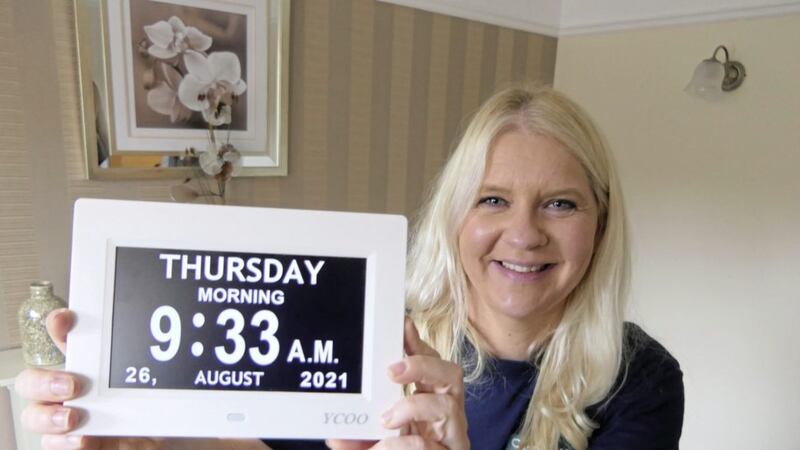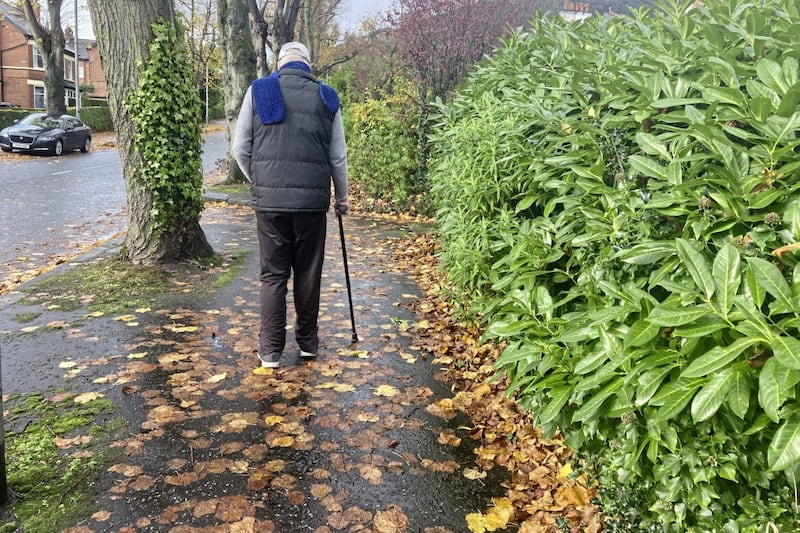I don't know about you, but I am constantly looking for my glasses only to be told they are on the top of my head. I have a habit of going upstairs for something and having no idea for what once I get there. I apparently repeated a question recently - with a gap of about 10 minutes between - but there were looks between family members. Lack of concentration.
I think dementia is at the back of many minds these days. It is so prevalent and, thankfully, in the public eye there is an increased awareness.
BBC's Holby City is now featuring the condition where Dr Dom's mother Carole is in his ward and it allows him to see first hand what she's going through.
Indeed, he takes her on an imaginary trip to the seaside which gives her some joy and is an idea for carers. Now Denis Law joins the hundreds of other footballers with this disease. The thought is that heading the ball has contributed to this condition and research goes on, hopefully with positive news for everyone.
In Northern Ireland it's estimated that 20,000 people are living with dementia and that number is projected to double by 2040. It's obviously a fearful fact not only for the patient but draining for family carers, both emotionally and physically.
WHAT CAN BE DONE TO EASE ANXIETY?
As I wrote last week on this page, Dementia Friendly East Belfast and similar organisations throughout Northern Ireland are working with the public to come to terms with this disease and offer the best advice possible.
Gillian McEvoy from Age Friendly Belfast has some great ideas on how to make your home more user-friendly, not only for those living with dementia but also for every one of us.
For instance, having a double banister is a godsend in my experience, great for keeping your balance and for hauling yourself upstairs at the end of a fraught day.
But Gillian takes this one step further - so often it's a white hand rail against a white wall, and she recommends a coloured rail so it stands out and is more easily seen.
She recommends taking a walk around your home, starting outside with some simple steps to identifying the house and so to cut down on possible confusion.
"Paint the door a bright colour, plant a large colourful bush near the gate. A plaque with the house number is also a good idea. Careful with steps up to front door and especially inside in the hall, is the mat really necessary?" she says.
"Even inside the house, painting door frames and saddles a bright contrasting colour to help define moving from one area to another. Lighting is vitally important, make it three times brighter than usual."
I KNOW FOR A FACT
I was at a service in the bright and airy Whitewell Tabernacle on the Shore Road in Belfast when I realised I'd forgotten my glasses and wouldn't be able to join in the hymns.
When I opened the book, however, by some miracle I could see the words clearly. I was about to run down to the front and tell the Pastor of this amazing phenomenon.
My companion stopped me and calmed me down so I just accepted this was a gift from God which sadly ended with the close of the service. The following week I was lunching with a television camera man and I was relating the experience.
I wasn't wearing glasses and I glanced down at the menu thinking the miracle might happen again but no, couldn't read a word.
"Don't worry," he said, "come on." And he marched me from the back of the dimly lit restaurant to a table by the window.
"Try now," he commanded. Without specs I could see as plain as day.
"Lighting," was the answer.
Moving upstairs in the house, check the landing, move anything that shouldn't be there and is a trip hazard - the whole house, upstairs and downstairs, must be easy to navigate.
"These doors off the landing look much the same so name them with cards at eye level: bathroom, bedroom etc. With the bedrooms even put a picture of whose room it is so it's immediately obvious who sleeps where," says Gillian.
"Mirrors are another issue. Sometimes the person living with dementia won't immediately recognise their reflection and think there's a stranger in the house."
Her suggestion is to put up a white board in place of the mirror - again on a contrasting wall colour - and write on it the daily routine: putting the bins out, a friend calling, a library book to return, just an aide memoire, a memo to self, and keep a pen on a string attached so notes can be updated either by the carer or the person who requires assistance.
"Keeping furniture in the same place is important so it's easy to find the right chair or move to the table, familiarity is vital to navigation. See-through cupboard doors help in the kitchen," continues Gillian.
"Having an album of family photos around with the names written alongside is a great source of conversation which gives stimulation to the brain. An orientation clock is useful in any household, it shows on the screen the day, the time and the date."
Likewise, a special telephone with large numbers and a place where you can stick on pictures of people frequently phoned so it's just a matter of pushing the picture and getting through to the person you wish to speak to. These aids are perfect for those with a visual impairment.
Gillian adds that the fire brigade and Bryson House will carry out home safety checks on request and can also provide some useful gadgets which will make a difference.
For much more information contact Dementia Friendly East Belfast at dementiafriendlyeastbelfast.com.
Further support from Alzheimer's Society (028 9038 7787) and Dementia NI (028 9068 6768).








